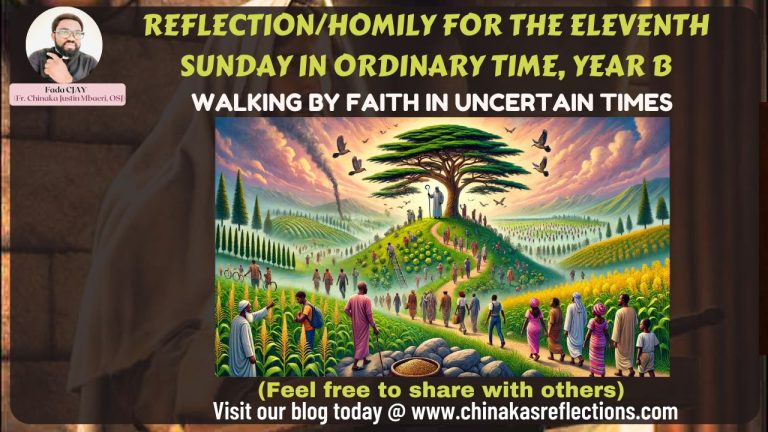WALKING BY FAITH IN UNCERTAIN TIMES
First Reading: Ezekiel 17:22-24
Responsorial Psalm: Ps. 91(92):2-3,13-16
Second reading: 2 Corinthians 5:6-10
Gospel Reading: Mark 4:26-34
________________________________________
In times of uncertainty and turmoil, it is easy to feel lost, anxious, and overwhelmed. The world around us may seem chaotic, and the path forward unclear. Yet, it is precisely in these moments that we are called to walk by faith, trusting in God’s unseen work and sovereignty. This should remind us that even when circumstances are challenging, our faith in God can provide the strength and assurance we need to persevere. Dear friends in Christ, this Sunday’s readings invite us to trust in God’s mysterious and sovereign work in our troubled world.
From the First Reading (cf. Ezekiel 17:22-24), we hear of God’s promise to take a sprig from the lofty top of a cedar and plant it on a high and lofty mountain. This imagery in the Hebrew parlance speaks of hope and restoration. The “sprig” (קָרֶת – qaret) symbolizes a fragile beginning with the potential for great growth. The “high mountain” (הַר – har) represents stability and divine presence. This prophecy assures the exiled Israelites that God has not abandoned them but will restore them and make them flourish once again. The cedar tree, known for its strength and durability, signifies the enduring nature of God’s promise. This offers a powerful message of hope and renewal, assuring us that God is at work, even in the most difficult circumstances. This message reflects itself in the Responsorial Psalm (91[92]:2-3,13-16) “The just shall flourish like the palm tree, and grow like a cedar in Lebanon.” These words remind us that those who trust in the Lord will find themselves strengthened and renewed, even in the face of adversity. The imagery of flourishing trees here connects to the promise in Ezekiel, reinforcing the message of divine care and providence. Thus, our passage is a Messianic prophecy where God promises to raise a descendant from the line of David—a sprig from the lofty cedar—who will bring glory to Israel. Little wonder Jesus describes the humble mustard shrub growing into a large plant, providing enough space for birds to nest in its branches, mirroring a similar imagery found in the first reading.
A practical application of this message mirrors itself in the Second Reading (cf. 2 Corinthians 5:6-10), where Paul encourages the Corinthians to live by faith (πίστις – pistis), not by sight, confident in their ultimate home with the Lord. He reminds them of their accountability before Christ and urges them to aim to please God in all they do. This passage calls us to maintain our faith and hope, even when we face uncertainties and challenges, knowing that our actions have eternal significance. Here, the Greek word for faith (πίστις – pistis) illustrates the trust and reliance on God’s promises and His sovereign plan. Paul’s exhortation to be “always confident” (θαρροῦντες – tharrountes) captures the need for a steadfast trust in God’s providence.
In the light of all these, dear friends, we learn that walking by faith in uncertain times requires us to trust in God’s unseen work and sovereignty. Like the sprig in Ezekiel, the seeds in Mark, and the faithful in the Psalm, we are called to place our confidence in God’s promises. We must live with the assurance that, despite the challenges we face, God is at work, nurturing growth and bringing His kingdom to fruition in ways beyond our understanding. Practically, this means we should cultivate a life of prayer and trust, seeking to discern God’s presence in the small and often unnoticed moments of our lives. It calls us to be patient and to persevere, knowing that God’s timing is perfect. We are encouraged to live with integrity and purpose, aiming to please God in our daily actions, and trusting that He will bring about His purposes in His own way and time.
Sadly today, Nigeria is faced with a tough time of social and economic meltdown, the challenges may seem overwhelming. The first year of President Tinubu’s administration has brought political failures, inflation, and ongoing tussles for minimum wage between labour force and the government, while politicians live in affluence. In such times, it can be incredibly difficult to maintain hope. Yet, it is precisely in these moments that we must cling to our faith even more tightly. May we continue to trust in God’s promise to renew our strength. Remember that, just as the sprig from the cedar will grow into a mighty tree, so too will our nation rise again through faith and perseverance. God is at work, even when we cannot see it. Let us continue to walk by faith, knowing that our struggles are not in vain. The Kingdom of God grows mysteriously and powerfully, and our trust in Him will not be disappointed. As we face these difficult times, let us support one another, live with integrity, and strive to please God in all we do, confident that He is with us and will guide us through to better days.
Shalom!
© Fr. Chinaka Justin Mbaeri, OSJ
Seminário Padre Pedro Magnone, São Paulo, Brazil
nozickcjoe@gmail.com / fadacjay@gmail.com
__________________________
Have you prayed your rosary today?



Well said, Padre.
Thanks a bunch!
Thanks Fr, for this soul lifting homily. There is no other better time to have such a thorough researched and encouraging words than now. May God bless your wisdom.
Thank you for reassuring us of our faith and perseverance in God.
Amen
Good exegesis Padre. Nice one
Amen